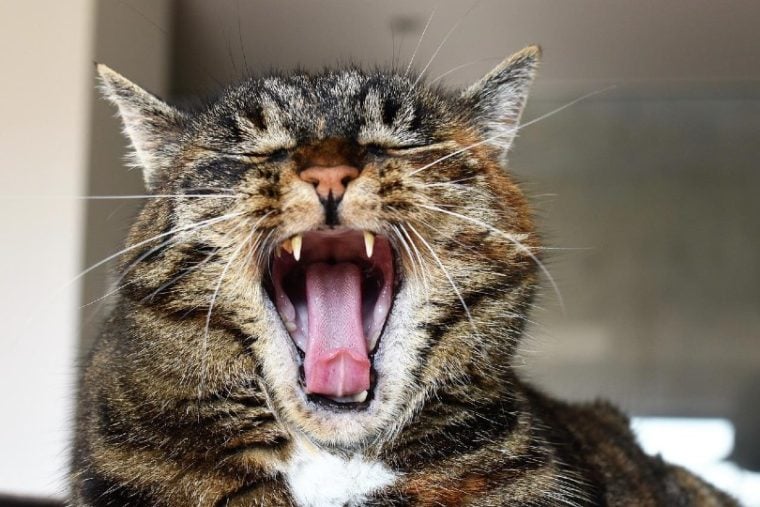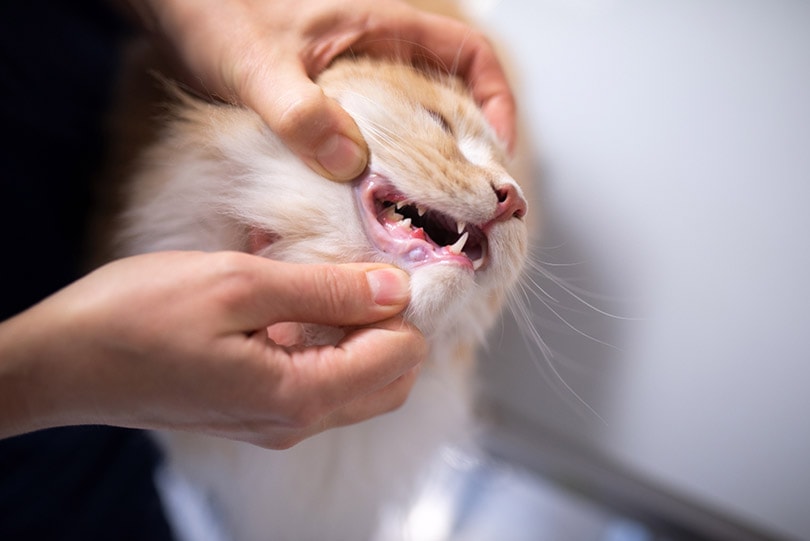
Many cat owners are familiar with how often cats groom themselves with their rough tongues and have even occasionally found themselves on the other end of a grooming session themselves.
If you’ve ever been groomed by your cat, you may be asking yourself, “How clean is my cat’s mouth?” You may even be wondering how it compares to a human mouth.
Read on to learn just how clean your cat’s mouth is and how it compares to your own.

How Clean Is a Cat’s Mouth?
While there aren’t exact numbers concerning how many types of bacteria live in your cat’s mouth, cats’ mouths do contain disease-causing bacteria, which can be passed on to humans. The bacteria in their mouth can also cause health issues for the cat itself, such as gingivitis, periodontal disease, and tooth loss. What does that mean for humans with cats that like to give them the occasional “bath?” How concerned should you be if your cat bites you?

Zoonotic Diseases
Zoonotic diseases are illnesses that can be transferred from an animal to humans. Most humans are at low risk for zoonotic diseases, but those with weakened or immature immune systems should take precautions to avoid catching diseases from their cats.
Cat bites can quickly spread infection because their teeth are like tiny needles puncturing the skin and leaving behind bacteria. If you’re bitten by your cat, you should clean the wound thoroughly and call your doctor to see if you need antibiotics.
Common bacteria and viruses found in a cat’s mouth that can cause illnesses in humans include:
Pasteurella multocida
Found in 70% to 90% of cat mouths, it’s found in 50% to 80% of humans when they seek medical assistance after a bite. Pain, redness, and swelling appear within 24–48 hours, and if left untreated, the bacteria can spread throughout the bloodstream causing severe illness.
Bartonella henselae
Commonly known as Cat Scratch Disease (CSD), Bartonella henselae is usually transmitted via scratch but has been known to travel via a bite or through a cat licking an open wound. Swelling and blistering usually develop at the site of infection and the lymph nodes may become swollen and painful. Fever, joint aches, headaches, and more may occur. This disease can take months to clear, so discouraging scratches and bites, controlling fleas, washing hands after handling the cat, and keeping cats indoors decrease the risk of CSD.
Rabies
This viral disease attacks the central nervous system and is usually fatal. Cats are highly vulnerable to the rabies virus and should be vaccinated to prevent catching or spreading the disease. If you suspect your cat has rabies and you have been bitten, contact both your pet’s vet and your doctor to get care immediately.
How Does a Cat’s Mouth Cleanliness Compare to Humans?
There’s a common myth that dogs’ and cats’ mouths are cleaner than human mouths, but studies are showing that our pets have just as much bacteria in their mouths as humans. Dogs host around 600 distinct types of bacteria in their mouths while humans have over 615 types of bacteria in their mouths. There don’t appear to be similar studies yet detailing how many different types of bacteria live in a cat’s mouth, but a microbiome of different types of bacteria that contribute to periodontal disease has been found in the mouth of cats.


Conclusion
When it comes right down to it, neither our mouths nor our cats’ mouths are not too clean. They both likely contain hundreds of different types of bacteria that can cause illness. Immune-compromised individuals are more likely to develop issues from their cats licking them, but cat bites should always be cleaned immediately with disinfectant and then looked at by a doctor.
Featured Image Credit: Pitsch, Pixabay






